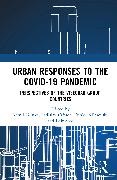Read more
This book provides a broad analysis of the important and ongoing issue of municipal self-governments' response to the Covid-19 pandemic in the Visegrad Group countries with the special emphasis on the post-pandemic recovery.
List of contents
Preface
PART 1.
MUNICIPAL SELF-GOVERNMENTS OF THE VISEGRAD GROUP COUNTRIES AND THE COVID-19 PANDEMIC - BETWEEN NATIONAL AND EUROPEAN PERSPECTIVE
1. The COVID-19 pandemic as an unprecedented challenge for municipal self-governments
2. The European reaction to the urban COVID-19 pandemic crisis and recovery
3. The impact of the Visegrad Group on the European response to the COVID-19 pandemic - the urban perspective
4. Urban response to the COVID-19 pandemic - in search of a theoretical model
PART 2.
URBAN PANDEMIC COUNTERMEASURE AND POST-PANDEMIC RECOVERY IN THE VISEGRAD GROUP COUNTRIES - OVERALL VIEW
1. The urban response to the COVID-19 pandemic crisis and recovery under the pressure of the recentralization. Lessons from Poland
2. The changes in Czech urban policies during and after the COVID-19 pandemic
3. The impact of the COVID-19 pandemic on municipal self-governments and its post-COVID-19 recovery. Evidences from Hungary
4. Municipal self-governments in Slovakia during and after the COVID-19 pandemic: fast reactions, quick adaptation, limited capacities, and reform impetus
PART 3.
DILEMMAS OF URBAN POLICIES DURING THE PANDEMIC AND POST-PANDEMIC PERIOD IN THE VISEGRAD GROUP COUNTRIES
1. The impact of COVID on the economic situation of municipalities and their socio-economic life
2. Public urban transport in the face of the COVID-19 pandemic: current trends, technological opportunities, and social challenges
3. Education in the (post)pandemic crisis - challenges and prospectus
4. Culture in the pandemic and post-pandemic period. Lesson learned?
5. The effects of the COVID-19 pandemic on the implementation of the green city concept
6. Youth participation in the shadow of the COVID-19 pandemic
7. Municipalities and recovery plans: a missed opportunity?
8. The transnational cooperation of municipal self-governments within Eurocities. European Green Deal as the COVID-19 pandemic response instrument
9. Democratically, or how? The impact of COVID-19 emergency measures on urban democracy,
PART 4.
THE VISEGRAD GROUP AND NEIGHBORS - COMPARISON OF THE RESPONSES TO THE COVID-19 PANDEMIC IN A EUROPEAN PERSPECTIVE
1. German response to the pandemic crisis. Lessons from the pandemic period and the analysis of the post-pandemic recovery mechanisms
2. Navigating the complexities. Municipal self-governments in the face of the COVID-19 pandemic in Ukraine,
Conclusions
About the author
Kamil Glinka is a PhD with habilitation in the political science, an associate professor and vice-director for the science and development at the Institute of Political Science at the University of Wroc¿aw (Poland), a member of Steering Committee of Standing Group on Central and East European Politics of the European Consortium for Political Research, METREX Bernard Steinacher Fellow 2022-2023, an author of publications on theory of state, public governance, urban policy, public communication, a practitioner collaborating with municipal self-governments and non-governmental organizations in Poland.
Ladislav Cabada is a full professor, a vice-rector for research and creative work as well as a vice-rector for quality and development of the Metropolitan University in Prague (Czechia), a member of Executive Committee of the European Consortium for Political Research, a visiting scholar at Ludovika University of Public Service (Hungary), a senior president of the Central European Political Science Association.
Daniel Klimovský is a PhD with habilitation in political science, an associate professor at the Department of Political Science of the Faculty of Arts of the Comenius University (Slovakia), an author of publications devoted to public administration as well as political issues linked to sub-national levels, an advisor and expert to municipal self-governments and government administration in Slovakia.
Edit Soós holds a PhD in political science, habilitation in legal sciences, an associate professor at the Faculty of Law of the University of Szeged (Hungary), an author of publications devoted to Central and Western European politics and policies, the EU law and European integration. As a practitioner she collaborates with municipal self-governments and public institutions in Hungary.

